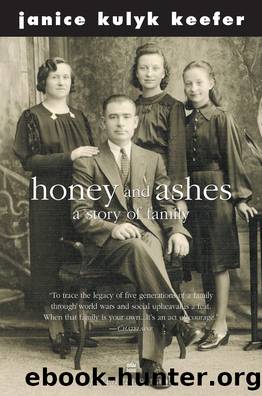Honey and Ashes by Janice Kulyk Keefer

Author:Janice Kulyk Keefer [Keefer, Janice Kulyk]
Language: eng
Format: epub
ISBN: 9781443440424
Publisher: HarperCollins Canada
Published: 1998-10-14T16:00:00+00:00
Tomasz joined the Ukrainian Galician army and marched against his fatherâs people. The Poles, under General Haller, had the benefit of troops seasoned in the First World War. Against these soldiers in their blue, French-made uniforms and with their state-of-the-art weaponry, the Ukrainians were forced to pit an army of volunteers, many of them teenaged peasant boys, badly shod, ill-armed and even worse fed. After a nine monthsâ struggle to hold their ground, the Ukrainians ended pinned against the river Zbruch. âOn 16 July 1919, with Polish artillery hammering at their backs, the Galician army and thousands of West Ukrainian civilians crossed the Zbruch into Eastern Ukraine.â There they joined Semyon Petliuraâs forces in their attempt to wrest control of Kyiv from the Bolsheviks.
Did Tomasz cross the Zbruch that muggy, blood-soaked day in mid-July and march into Kyiv with the Galician army? Would he have been disgusted by this armyâs refusal to engage an advance guard of Denikinâs White Russian troops, and thus secure control of Kyiv? For the city fell to Denikin, and soon after to the Bolsheviks once more. Petliura made his way to Poland and later Paris to set up a Ukrainian government in exile. Those of his men whoâd survived a savage typhoid epidemic made their own way home, starving, ragged, penniless.
I want Tomasz never to have crossed the Zbruch, never to have seen Kyiv. During the period of total anarchy in which eastern Ukraine became a handy killing field, it was not only soldiers who died but civilians, among them between 35,000 and 50,000 Jews, victims of a false but frequent equation, made by those who opposed the revolution, of Jews with Bolsheviks. If Tomasz did join Petliuraâs troops, as my mother says he did, he would have entered Ukraine after the worst of the Ukrainian-authored pogromsâthe Russians, White and Red, carried out their own killing sprees against the Jews. If he ever spoke of this carnage, I never heard it. But one of the immigrant men my grandfather knew in Toronto had a story of those brutal times that Iâve never been able to forget.
A young soldier has by some miracle provided himself with that most rare necessity, a horse. One rainy afternoon he rides his prize up and down the road outside the small village that his unitâs camped beside. Heâs a comical sight, with his uniform in shreds, his swollen feet bare except for the dirty rags heâs wound around them. What a fine thing it would be, he tells himself, if he could find a pair of boots, soft leather with thick soles that would last him through the war and take him safely home again. And as he rides his horse up and down the road, he catches sight of two Jews coming towards him, Jews in warm coats, wearing soft, new, leather boots.
I remember this story of a story passed onto me by my mother, but I canât distinguish anymore between what Iâve imagined and what I was told.
Download
This site does not store any files on its server. We only index and link to content provided by other sites. Please contact the content providers to delete copyright contents if any and email us, we'll remove relevant links or contents immediately.
The Hite Report on Shere Hite by Shere Hite(1666)
The One Percenter Encyclopedia by Bill Hayes(1468)
Benjamin Franklin: An American Life by Walter Isaacson(1402)
Benjamin Franklin : an American Life by Walter Isaacson(1006)
Book of Obituaries by Ann Wroe(973)
Who's Who in the Age of Jesus by Geza Vermes(938)
On Sparta (Penguin Classics) by Plutarch(928)
God Is Not Great by Christopher Hitchens(918)
A Treasury of Royal Scandals by Michael Farquhar(871)
Bloodletters and Badmen by Jay Robert Nash(862)
Agatha Christie Murder in the Making by Agatha Christie & John Curran(855)
Heroes by Paul Johnson(799)
The Fortunate Pilgrim by Mario Puzo(786)
Men in Dark Times by Hannah Arendt(772)
A Dictionary of Political Biography by A Dictionary of Political Biography(752)
Stepping Stones by Dennis O'Driscoll(732)
The Motion of Light in Water: Sex and Science Fiction Writing in the East Village by Delany Samuel R(724)
Agatha Christie's Secret Notebooks by Agatha Christie & John Curran(714)
Devil May Care by Unknown(706)
